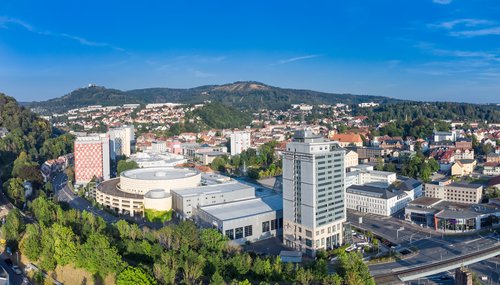Transforming Thuringian Spaces: Bauhaus-Universität Weimar Students Launch Projects in the Thuringian Forest
The rural Thuringian Forest is facing major challenges in managing the current social and ecological crises. But impending change provides opportunities. To identify these, many of the Bauhaus-Universität Weimar’s Institute for European Urban Studies (IfEU) planning projects from October 2024 to July 2025 are focussing on the Thuringian Mittelgebirge, an area rich in tradition. Under the title »Räume in Transformation Thüringen« (RiTT), students from the Faculty of Architecture and Urbanism are working closely with local partners to develop ideas on how sustainable and geographically equitable development in the region could succeed.
Climate change, a lack of public services, an ageing population, shrinking communities, a loss of trust in democracy — the Thuringian Forest is facing a broad range of challenges. The region is now in the middle of a fundamental process of change. This change, however, doesn’t just mean danger and crises. Coordinator Dr. Hendrik Sander is convinced that the IfEU project will be an opportunity for rural areas in south-west Thuringia. He explains: »Committed individuals from the fields of politics and administration, civil society initiatives, and visionaries are already testing approaches for an ecologically and socially just transition. We are hoping to engage in a dialogue with them. We want to work together to develop analyses and ideas and to discuss these with locals from the region.«
The Institute for European Urban Studies is expanding its work in sustainable spatial development with the RiTT project. Prof. Sigrun Langner, Director of the IfEU, exlpains: »The focal point of our work is to foster greater spatial and environmental justice. This goal drives our research, teaching, and project design. But this goal is not limited to our lecture halls at the university; we also engage with society with this goal in mind. The Thuringian Forest project is an important step in this direction.«
The instructors and students involved hope to first understand the situation in the Thuringian Forest. This includes debates and finding out what moves people. The next step is to find out what obstacles are standing in the ways of a just change. Most importantly, the project aims to develop concrete solution proposals and make implementing these solutions feasible in their concept and design.
The project groups will approach the various regions with very different questions in mind: How has tourism changed the villages over time? How can historically evolved forest and cultural areas become more sustainable in the face of climate change? How can migrants in the region be well integrated? How can the new »Oberzentrum Südthüringen« contribute to these goals? One of the project groups plans to breathe new life into an empty shop located at Topfmarkt 1 in Suhl from 4 to 7 November where they will engage in conversation with local citizens. A separate invitation will be sent out for participation opportunities.
Further information can be found at: www.uni-weimar.de/ritt
Contact:
Dr. Hendrik Sander
RiTT Project Coordinator at the Institute for European Urban Studies
Phone: +493643/58 26 09
E-mail: hendrik.sander[at]uni-weimar.de


